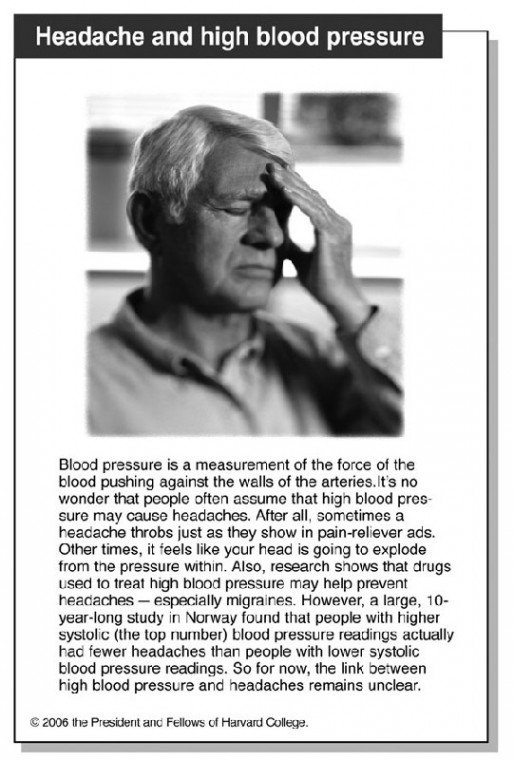Q: Does high blood pressure cause headaches?
A: Throbbing, painful headaches may sometimes feel as though
they’re the result of high blood pressure. But there’s actually no
clear evidence of a link between these two common conditions.
The Faculty of Harvard Medical School
Q: Does high blood pressure cause headaches?
A: Throbbing, painful headaches may sometimes feel as though they’re the result of high blood pressure. But there’s actually no clear evidence of a link between these two common conditions.
Chronic headaches are nearly always caused by something other than high blood pressure. And most people with high blood pressure do not suffer from chronic headaches. However, they do face a higher-than-average risk of a more devastating brain problem: a stroke.
Blood pressure is determined by the amount of blood your heart pumps and the amount of resistance to blood flow in your arteries. Everyone’s blood pressure varies throughout the day. It rises during activity and falls with rest. But if your blood pressure is consistently higher than 120/80, you have high blood pressure, or hypertension.
Most of the time, people with high blood pressure – even when it’s high enough to cause damage to the body – have no symptoms at all. In fact, many Americans have high blood pressure and don’t even know it.
In these people, the intense pounding of blood gradually damages the walls of the arteries that supply oxygen-rich blood throughout the body. The artery walls actually thicken and become less flexible. When that happens, less blood can pass through, which means that the organs and tissues don’t get as much oxygen and nutrients. The vessel walls are also more likely to burst. Over the long term, untreated high blood pressure harms not just the blood vessels themselves, but also the brain, heart, kidneys and eyes.
Untreated hypertension is the No. 1 cause of stroke, which is the third-leading killer in the United States. If you have a blood pressure of 160/95 mm Hg, you’re about four times more likely to have a stroke than someone with normal blood pressure.
Blood vessel wall damage makes arteries more likely to become clogged with fat and other debris. This build-up narrows arteries, which sets the stage for an ischemic stroke – when a blood clot blocks blood flow to the brain. High blood pressure can also lead to a less-common type of stroke, called a hemorrhagic stroke. These occur when a vessel in or near the brain ruptures, such as happened recently with Israeli Prime Minister Ariel Sharon. Thus, hypertension can lead to either of the two main types of stroke.
A mild stroke may cause few or no lasting problems. But about one-third of major strokes are fatal. Another third cause permanent damage, such as weakness or paralysis on one side of the body or problems with seeing, speaking and thinking.
Hypertension also increases your risk of heart attack, which occurs when a heart artery becomes completely blocked. High blood pressure also forces the heart to work harder to drive blood through the body. As a result, the heart’s main pumping chamber becomes thicker and more muscular in order to contract with greater force. This can increase the risk of heart attack and heart failure.
Heart failure arises when your heart becomes so weak it cannot pump forcefully enough, or when your heart can’t properly fill with blood because it’s stiff and has trouble relaxing. Symptoms of heart failure include weakness and fatigue, shortness of breath, and the build-up of fluid in your lungs, feet, ankles and legs.
In addition to these serious problems, high blood pressure can also raise the risk of dementia, which causes thinking difficulties and memory loss. Damage to the kidneys and eyes are other worrisome complications of high blood pressure.
The bottom line for people who have high blood pressure and headaches is to work with your doctor to find effective treatments. These may include both medications and lifestyles changes, such as losing weight, exercise, and stress reduction. And be sure to have your blood pressure checked at least one a year.
Submit questions to the Harvard Medical School Adviser at www.health.harvard.edu/adviser. Unfortunately, personal responses are not possible.













